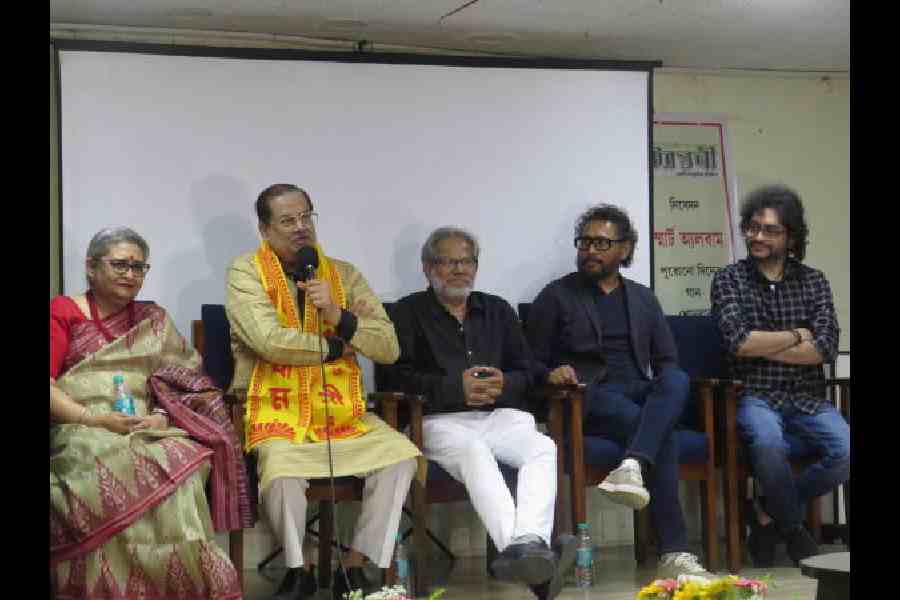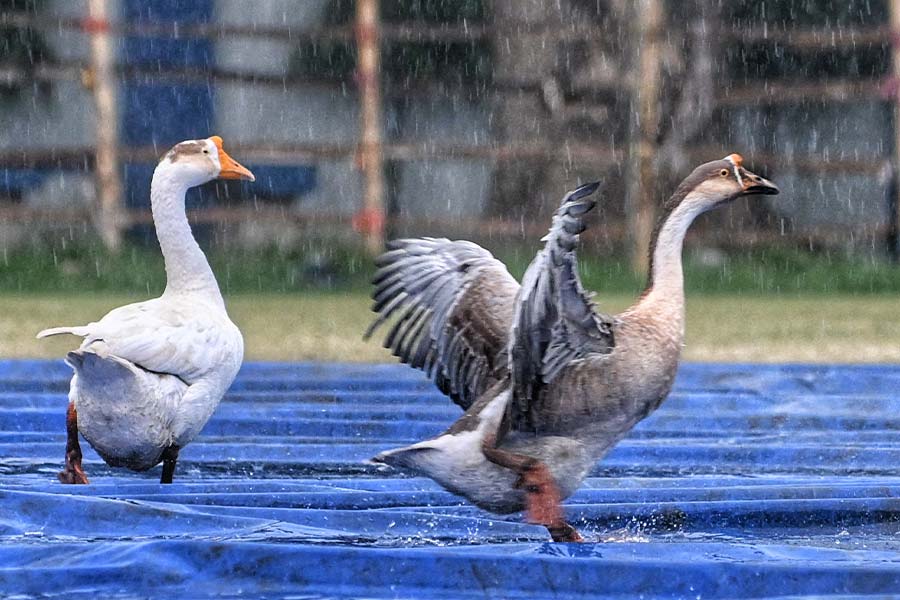A technology that is used to access menu cards virtually these days at restaurants and used as a payment gateway at shops can be even used to listen to music seamlessly on the internet.
Dr Purnendu Bikash Sarkar, a resident of Purbachal who gave a demonstration on his suggested method last Saturday, has already made a mark with his mix of academic research and technology in his Gitabitan Archive, an interactive software that contains a treasure trove of information on Rabindrasangeet as well as recordings of songs, each sung by different artistes. His research, also printed as a book titled Gitabitan Tathyabhandar, was awarded Ananda Purashkar last year.
“Do you not yearn to own music that you love? Just like you used to buy long-playing records, cassettes and CDs and stock them at home? But it is difficult to find music players to play these albums now,” said Sarkar at an event at Bangla Akademi.
The other alternative, he pointed out, required typing out the song on a search engine like Google and wait for the options to pop up. “This can be a cumbersome process with the song of one’s choice being buried after several other songs in an album or after multiple advertisements which have to be played out to reach it,” he said.
Sarkar’s solution is a QR code. “Entire albums can be thus encapsulated on smart cards. All you have to do is scan the code once,” he said, taking a smart album out, scraching off the cover and scanning the code with a code-reading app on his smart phone.
Sarkar’s label has produced five such smart albums, one of poetry recited by his wife Barnali Sarkar and others of songs and poety by various artistes. The albums are uploaded in the cloud storage of YouTube. “But there are no ads here as I did not add any. The scan plays the tracks directly. Nor does one have to wait for the songs to play in the order of recording to reach the track of choice. The tracks can be shuffled at will.”
The eye specialist, who runs Salt Lake Eye Foundation in IA Block, pointed out that one need not even carry the smart card around. “If you scan it using a QR code scanning app, the link will stay stored in the search history, so you can click on it whenever. You can even rename the code according to the album name or subject. But since the song is not getting downloaded, there is no strain on the phone storage space,” he said.
The other benefit of the technology is that the maker of the card can make additions or deletions to the content at any time. “If a singer releases a smart album and later realises he wants a different song to be a part of it, he can make the change in the cloud. The updated collection will play when the card is swiped again,” he explained.
Sarkar admits that the technology is an old one. “But no one had thought of using it this way.” Nor does he have any financial incentive. “I will be happy if music companies start using it to produce such albums. The technology is quite affordable.”
One can put the content under a paywall as well, as are the advertisement-free premium versions of music apps like Spotify or Apple Music. But Sarkar has no intention to block the content he has put up. More content, he admitted, will be available only when more albums are released in this format. Creators of the smart album have to be the copyright holders for the content used. But thereafter, there is no scope of piracy from the listener’s side even if the music link is shared for listening. “Each share will only lead to more YouTube views, leading to financial benefits by way of royalty for the artist or the music company, whoever has created the QR code,” he said.
Such QR code-based albums can be used for distributing educational content or travel promotion also, he pointed out.
Words of praise
Veteran singers from various musical backgrounds were present at the launch. “I teach almost 1,000 students. Many of them sing better than established singers. If this technology is affordable, I would love them to get a platform,” said Pandit Ajoy Chakraborty. He got nostalgic recalling the covers of long-playing records. “The footnote to my first kheyal album was written by Satyajit Ray. Premendra Mitra, Gyanprakash Ghosh and Deepali Nag had also written such footnotes for me. I love to read those writings. So I wish the smart albums be a big bigger so that some information related to the content can be printed on the cover,” he said.
Frontman of the rock band Fossils, Rupam Islam, said he came to the launch as he was keen to learn about the innovation. “I belong to a rare breed of listeners which still consumes music in all formats - CD, cassettes, vinyl record and digital. I still own equipment to play songs in each format. YouTube has an ad-less subscription model, on Spotify I can keep my favourite artistes arranged in the app’s library. But this technology has the potential to reach somewhere magical,” said Rupam.
Agreed filmmaker Shoojit Sircar, a resident of BL Block: “Doctor babu has pointed to the technology. Music companies can take it to the lab and fine-tune it,” said the director of Piku.
Though music companies have stopped producing albums as music is largely consumed online, Rupam recalled an experiment he did in 2020. “The last album I did with Amyt Dutta, titled Ami, was published at the Book Fair as a CD. I was adamant not to give the album to a digital platform. Dozens of people queued up to listen to the album at the fair. Some even bought CD players to play it. It was a successful experiment till Covid forced us to upload it.”
Veteran Rabindrasangeet singer Pramita Mullick and poet Subodh Sarkar were also present. “I am waiting for the day when music companies and artistes will queue up in front of doctor babu’s house to make smart albums,” the poet said.
SMART ALBUM
The technology: The album is stored on the YouTube cloud. Its gateway is encrypted as a QR (quick-response) code. It is a two-dimensional matrix barcode consisting of black squares arranged in a square grid on a white background, including some fiducial markers, which can be read and appropriately interpreted by a camera and the required data — songs, in this case — are then extracted from patterns in the QR image. The QR code contains the data for the cloud storage locator.
The process: One has to scan the code printed on the smart card with a QR code-reading app that can be downloaded from Play Store on one’s smart phone. The album starts to play. The link remains saved in the history.






